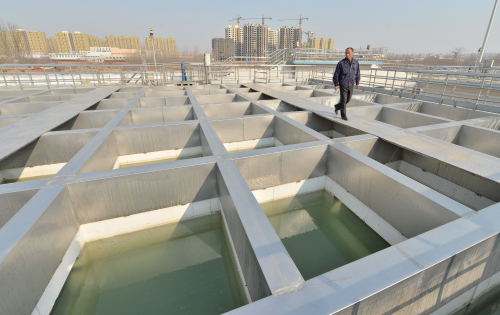|
 |
|
CLEAR AND CLEAN: A staff member of a water supply company examines reaction tanks in Shijiazhuang, capital of north China's Hebei Province. On February 8, water from the south reached the city through the South-to-North Water Diversion Project (ZHU XUDONG) |
Medical Insurance
Commercial insurers are expected to play a more important role in providing medical insurance to a rapidly aging population in China, a top health official said on February 6.
The government will encourage the development of various types of commercial insurance to increase people's ability to deal with risks posed by major diseases, Ma Xiaowei, Vice Minister of National Health and Family Planning Commission (NHFPC), said at a news conference.
"The number of old people in China is increasing fast, and this is putting a lot of pressure on its medical insurance system," Ma said. "A new survey shows the proportion of people aged 65 or above who go to a hospital for treatment is more than double that of young people."
According to the NHFPC, the number of people aged 60 or above reached 202 million in China in 2013, accounting for about 15 percent of the total population. In the past two decades, the Chinese Government has established a vast medical insurance network, covering 1.3 billion people, Ma said.
Sun Ting, an analyst from Shenyin & Wanguo Securities, said commercial health insurance represents a very small portion of the whole market and is mainly targeted at high-income groups to provide them with customized services.
"The development of commercial health insurance needs policy support," she said.
China-Italy Link
China's Hainan Airline will begin direct flights from southwest China's Chongqing to Rome from April 27, the Consulate General of Italy in Chongqing said on February 8.
The flight will cut the travel time between the two cities to about 13 hours. The route will run every Monday and Friday, departing from Chongqing at 1:30 a.m. and arriving in Rome at 7:50 a.m. The returning flight departs from Rome at 12:50 p.m. and lands in Chongqing at 5:45 a.m. the next day.
Meanwhile, the new visa center of the consulate will begin accepting Italian visa applications on February 16
from Chongqing, Sichuan, Yunnan, Guizhou, Gansu, Shaanxi, Hubei, Qinghai provinces and Ningxia Hui Autonomous Region, the consulate announced.
Applicants will not have to travel to Beijing to apply, and applications will be processed within two days with a fee of 60 euro ($68).
Alibaba's Ambition
China's Alibaba Group Holding Ltd. is taking a $590 million stake in domestic smartphone maker Meizu as the e-commerce giant tests ways to expand its mobile operating system in the handset market.
On February 9, Alibaba said it will buy an unspecified minority stake in smartphone maker Meizu Technology Co.
The deal is designed to help Alibaba push its mobile operating system within China through Meizu's handsets. In return, Guangdong-based Meizu will gain access to Alibaba's e-commerce sales channels and other resources, the companies said in a joint statement.
Dwarfed by rivals like Apple, Samsung, Xiaomi and Lenovo, Meizu's slice of China's smartphone market lacks appeal.
Meizu has pumped up shipments from a few hundred thousand in previous years to under 2 million in the last three months of 2014, but it still had less than 2 percent of China's smartphone market share in that quarter, said Nicole Peng, a Shanghai-based analyst with data research firm Canalys.
Dispute Settled
The Chinese affiliates of the "big four" global accounting firms agreed to pay a total of $2 million to settle a long-running dispute with the U.S. Securities and Exchange Commission (SEC) over their reluctance to turn over documents related to investigations of potential fraud, the SEC announced on February 6.
The Chinese-based units of PricewaterhouseCoopers, Deloitte Touche Tohmatsu, KPMG and Ernst & Young each agreed to pay $500,000 and take specific steps to provide documents to SEC investigators over the next four years, the SEC said in a statement.
The settlement follows a ruling by the SEC last year recommending the suspension of the Chinese affiliates of the "big four" for six months, which could have affected hundreds of Chinese companies listed in the United States and U.S. multinational companies operating in China.
"The settlement provides a path forward for obtaining productions and enhanced future cooperation from the 'big four' firms," said Antonia Chion, Associate Director of the SEC's Enforcement Division.
As part of the settlement, the Chinese affiliates admitted that they did not produce documents before the SEC started administrative proceedings against them in 2012, but they didn't admit or deny other findings in the order, the SEC said. | 